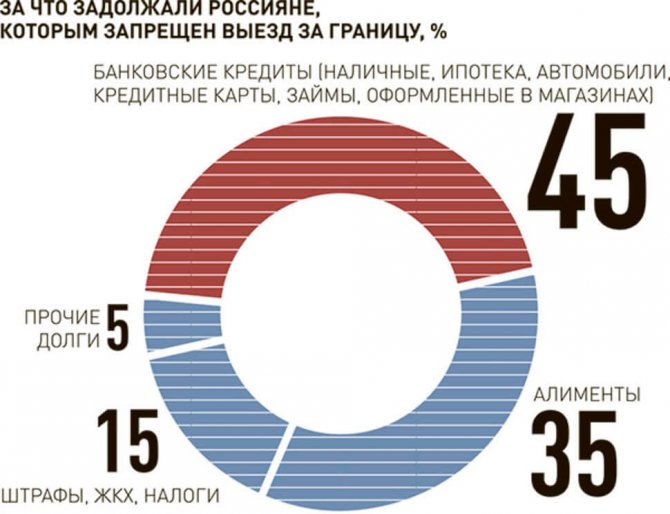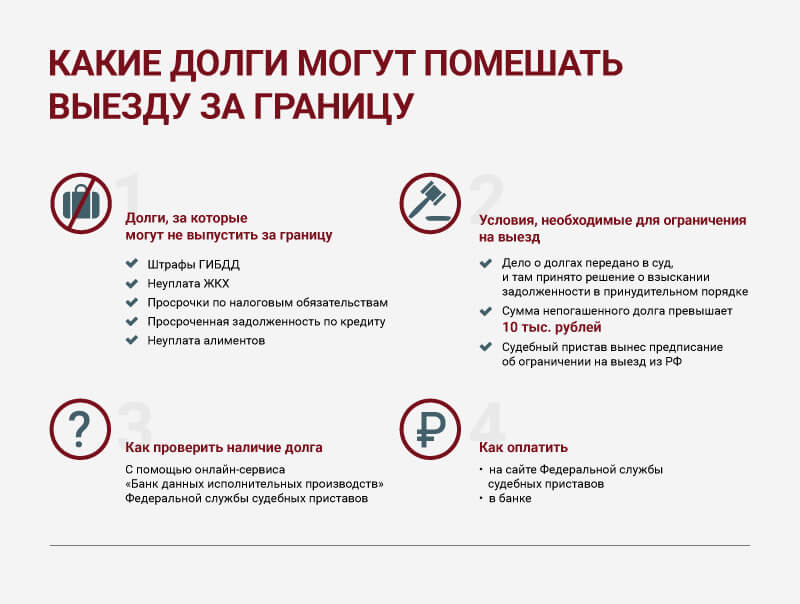Normative base
Every citizen of the Russian Federation, in accordance with Federal Law No. 114, is entitled to travel outside our country using a foreign passport (Article 2). This normative document states the existence of a temporary restriction on travel that applies to certain persons (Article 15). A special category should include:
- citizens liable for military service;
- individuals who have entered into an employment contract with the employer, which clearly states a ban on traveling abroad;
- citizens who have access to classified information;
- accused who have not yet received a court verdict;
- prisoners serving sentences;
- persons evading the fulfillment of court-ordered obligations;
- citizens who provided false information about themselves during the preparation of documents.
Article 16 regulates the activities of internal affairs bodies, obliging them to issue a written notification of the existence of imposed restrictions (indicating their reasons and duration of validity).
The migration service has the right to confiscate a foreign identity card for a certain period of time. In practice, having received a prohibition order on traveling abroad with debts, the service rarely takes such a step.
Instructions: traveling abroad with debts and how to check the debt
I met a friend of mine the other day. He walks in tanned and refreshed. He said he went on vacation and just returned. From Turkey. "So what? - our reader will ask. “The usual story.” Ordinary, but not quite. My friend is not allowed to travel abroad .
He's deeply in debt, and the clerks of three banks are racing to the bailiff to extend his travel restrictions. For people like that, our border is not only locked, it’s filled with concrete. How did he get to Turkey? I ask - did you probably give a bribe? And the friend laughs - here’s another thing: give them bribes. I left completely legally. Now I’ll also put photos from my vacation on Odnoklassniki so they can look at it. And he told me how he left. But more on that below.

Dubai Burj Khalifa
Now let's figure it out - which of the loan debtors need to look for less than direct ways to travel abroad? So: when should you go abroad through the “window”?
Travel outside the Russian Federation can be temporarily restricted only by court decision
If you have at least once had to communicate with a bank collection service or collectors of all kinds, you have probably heard one of their favorite threat phrases: “
You cannot go abroad with loan debts!” “Some particularly frostbitten debt collectors (of those who advise selling a kidney, liver, etc. to pay off arrears on a loan) simply say: “We will block you from traveling abroad!” Some individuals promise problems with moving out due to bad credit history. Personally, I immediately imagine a rather ominous picture: after promising to “ stop travel abroad ,” the collector in black presses a certain button, and the borrower, who is overdue for a payment of 1,000 rubles, becomes prohibited from traveling abroad for the rest of his life.
It’s good that such a picture takes place only in the inflamed brain of these telephone extortionists. Remember: no collector, ever and under any circumstances, can restrict travel abroad. And it doesn’t matter how much you owe: 500 rubles or a million. Just like your credit history - bad or good - does not concern our border guards. All these crazy tales are designed to make you rush to pay. Let's say you really have some debt - big or small - to the bank. This does not mean that you are not allowed to travel abroad. Because only the court can recognize you as a debtor. And only bailiffs - neither collectors nor bank clerks - can temporarily, on the basis of their own ruling, deprive you of the pleasure of soaking up the beach under the gentle Turkish sun. And that’s a huge stretch – but more on that in the second part of our article. Until there is a trial on your loan, let the collectors promise whatever they want. Let's not stop them from shaking the air - after all, they are simply not capable of more.
The decision to recognize you as a debtor through the court does not mean that you will not be allowed to go abroad
So, the bank still sued. And he won the case in court. This means that you are now a legal debtor. And the bailiffs began to “hunt” you.
Now we will not describe all the ways and methods of work of these “men in black”. In the context of this article, it is important for us that the bailiff can quite officially ban you from traveling abroad. This happens as follows: after the court decision has entered into force, enforcement proceedings on your debt go to a specific bailiff. He writes a certain bureaucratic document to the senior bailiff, and the latter issues a decision against you to restrict travel abroad. The bailiff sends this “black mark” to you by mail, and within 6 days after that it is considered that you have become familiar with it. Regardless of whether you even saw him in the eyes.
The resolution on temporary restrictions on travel abroad is called “temporary” for a reason. Its validity period is 6 months. And it is not renewed automatically. That is, your bailiff needs to do the entire procedure described above again. This means that after the expiration of the resolution, you have a certain “corridor” of 10-15 days. This is exactly how long it will take from the moment the old travel ban loses its legal force until the new one comes into force. During this period you can safely leave.
But bureaucratic red tape also has a downside - in the same way, you will not be immediately removed from the database of those restricted from traveling abroad, even if you fully repay the debt, and neither the bailiffs nor the banks will have any claims against you. At the border - be it an airport or a railway - there are not bailiffs, but border guards, and they have their own database. The information in it is not updated instantly, but after some time. So even if you completely close the debt issue, you will still be stuck in this database for some time. Usually no more than 2 weeks, but sometimes a month.
It is important to remember that the presence of you in the debtor database does not automatically mean that traveling abroad is prohibited. If you have not received a corresponding resolution, there is a fairly high probability that it simply does not exist in nature. How to find out exactly? To do this, you need to go to the office (information center) of the bailiff service at your place of registration. An important point: under no circumstances should you call or come to the bailiff conducting your enforcement proceedings. He, unlike the information center, is an interested person, and if you suddenly let him know that you are interested in traveling abroad, he may just initiate the issuance of a decision. Therefore, just come to the office with your passport, and there you will find out for sure whether you have restrictions on traveling abroad.
So, there is a restriction on travel, it is not yet possible to pay the debt, but it is very necessary to travel abroad. Is there really nothing that can be done? Of course you can!
A Russian and a Belarusian are brothers forever, or about the benefits of the Moscow-Kaliningrad train
In 2008, changes to the law “On Enforcement Proceedings in the Russian Federation” came into force, making it possible to prohibit travel abroad for debtors. From that moment on, our compatriots, who, despite their debts, still need to go abroad, actively began to look for loopholes to travel. And quite quickly they found not loopholes, but real windows!
Any debtor under the “border base” can travel abroad through Belarus. We do not have a border with this fraternal republic as such. You can go there either by plane or by train. Moreover, we recommend doing this using a Russian passport. Here, for example, is the Moscow-Minsk flight. Boarding is carried out through the internal terminal, bypassing border guards along with their “debtor bases”. From Minsk you can fly to any foreign country! If there are no suitable flights, go from Belarus to Ukraine: there is a wider choice of routes there. Of course, this is somewhat troublesome. But if you are blocked from crossing the Russian border, you have no choice: you need to leave through the Belarusian border.
From time to time, “horror stories” appear in the press that Russian and Belarusian “border guards” are about to create (or even have already created) a joint database of people banned from traveling abroad for debt, and then... All these conversations have been going on for several years now. Things, as they say, are still in the same place. And is it possible to create such a “base” legally? About a month ago, one of my friends was traveling from Moscow to Belarus by car. At the Berastovitsa-Bobrovniki checkpoint, Belarusian border guards approached him with a request to give a colleague a lift to Bialystok.
A friend of mine asked the Belarusian border guard a question that had been tormenting him for a long time: “Do they release Russian debtors abroad who are restricted from leaving the Russian Federation? And is there some kind of database, joint with Russia, of those banned from traveling abroad due to debts?”
“There is no such black base,” the border guard answered. – But it’s not even about her absence. Because we have no legal grounds not to allow debtor Russians to travel abroad. For us, any Russian is a foreign citizen, and we cannot prohibit him from leaving Belarus, unless he is on the international wanted list.”
Quite a comprehensive answer. If you follow our advice and fly abroad via Minsk, pay attention to the colossal number of Russian tourists flying in all directions. Try to communicate with them - and you will find out what prevented them from using their “native” Sherementyevo or Pulkovo.
“This is the second time I’ve traveled like this,” says Alexey, who is waiting to check in for a flight to Thailand. – The first time I got to Bangkok through Kyiv, since there were no suitable flights from Minsk. I flew from Perm on a domestic flight Perm-Moscow-Minsk, from Minsk I took a train to Kyiv, and from there I flew to Bangkok. He presented his Russian passport at the Belarusian-Ukrainian border, they inserted it into some kind of device, then at the Ukrainian border he presented his Russian passport and migration card (they are issued by conductors on trains). The Ukrainian border guard put a stamp on this card. At the Kyiv airport, I showed my foreign passport and this card, they put an exit stamp and that’s it! Back then and now I return on a direct flight to Moscow. It’s just that they don’t have the right to let a citizen out, but they are obliged to let a citizen home!”
If you have a Schengen visa, the Moscow-Kaliningrad train is quite suitable for traveling abroad. Buy a ticket to the first Kaliningrad station (Nesterov station). But don’t get there, but get off the train in Vilnius. At the checkpoint, present your passport with a visa - and you are already abroad! The most important thing is to try not to tell anyone about your desire to get off the train in Vilnius.
So, to summarize: you cannot travel outside the Russian Federation with debts. But it is possible. It's just that the detours will take you a little longer than the direct flight from Moscow. So have a nice trip! And don’t forget to bring souvenirs from your vacation for your bailiff.
Types of debts that will not be released with
The question that is losing its relevance is: with what debt are they not allowed to go abroad? If there is a debt obligation, the question of what the amount of debt should be for a citizen to temporarily lose his travel status becomes pressing. The legislation of our country (Federal Law No. 190) established a minimum amount of debt, exceeding which promises prohibitive measures regarding border crossings. In the following situations, the threshold is 10 thousand rubles:
- alimony is being collected;
- compensation for damage caused to health;
- the debt associated with the damage to the estate plan is paid;
- moral damages for the crime committed are compensated.
The minimum debt threshold for obligations with other requirements is 30 thousand. Evasion from fulfilling the obligations imposed by a writ of execution, attempts to avoid paying a particular amount (when payment is imposed on a citizen by a court) lead to the emergence of a legal obstacle to movement outside the country.

To summarize, it should be said that a citizen will lose the right to freely cross the state border if he does not pay financial charges on time for:
- alimony aimed at providing for a minor child (several children);
- loan payments (including mortgage payments);
- obligations to the tax authorities;
- payment for comm. services;
- compensation for personal injury;
- collections of property type;
- administrative fines.
“The situation deserves attention when a private entrepreneur has unpaid debts on taxes and fees. The tax authority has the right to initiate a collection procedure without obtaining prior consent from representatives of the executive branch.”
What debts can you legally leave the country with?
If the debt is less than 30,000 rubles, you can travel freely.
Currently, those who are malicious debtors risk not going abroad. A minimum amount of debt has been established, upon reaching which a citizen is prohibited from traveling outside the territory. The amount is 30 thousand rubles. This norm began to be used in 2020. Until this point, a limit of three times less was used. FSSP employees have the right to make arrests. Initially, it is necessary for the judicial authority to make an appropriate decision.
This process takes a long period of time. From the moment the court decision is made until enforcement proceedings are initiated, at least 2 months pass. Then the citizen is given 10 days to file a complaint if he does not agree with the adopted act. If the document is given legal force, then the debtor is given 2 months to pay the debt voluntarily. During the specified time, a person has the right to cross the border of the country without obstacles. It is worth noting that bailiffs have the right, but not the obligation, to restrict travel outside Russia.
This suggests that this measure is not applied in all situations. If the bailiff does not impose such a restriction, then the person is not included in the lists of Border Service employees. A citizen finds out about this when he is directly at the checkpoint. That is, there is a risk that you will have to postpone the flight. Then the downside is that you won’t be able to get a refund for a burned ticket. All responsibility is shifted to the citizen who incurred the debt.
You will be able to leave the country if:
- the amount of debt is no more than 30 thousand rubles;
- if there is no court decision confirming the existence of the debt;
- when the judge's decision has not received legal force;
- enforcement proceedings were not initiated by FSSP employees.
In addition, a person has the right to cross the border if he has taken measures to pay in installments or partially pay the debt. In this situation, it is necessary for the court to issue a private ruling.
Who can impose a travel ban?
The question of who has the right to impose restrictions seems extremely important. For example, exclusively the judicial authority will be responsible for this issue if we are talking about penalties of a property nature or compensation for moral damage. The connection between debts and travel abroad, when it comes to alimony payments, is also within the competence of the court. The fact that there is a debt to government agencies allows the latter to independently initiate enforcement proceedings. The list is as follows:
- traffic police of the Ministry of Internal Affairs;
- Customs Service;
- FSB;
- Police;
- The Federal Tax Service;
- Labour Inspectorate.

After the judge receives the relevant petition, a ruling is made. On its basis, after a three-day period, the bailiff issues a resolution prohibiting the debtor citizen from leaving the country. The peculiarity of such a resolution is that it is made without the participation of an individual in the process. This nuance is discussed in Federal Law No. 229, which deals with the topic of enforcement proceedings.
The process of imposing a ban on leaving the country
The first step in issuing a ban involves filing a claim in court. The creditor (in the broad sense of the word, i.e. the person to whom there is a debt obligation) applies to the judicial authority, deciding to bring the debtor to justice. Filing a claim is one of the last resort measures when the delay in paying the debt exceeds acceptable limits. The decision made by the court must be executed on time, provided that it has not been challenged in a higher authority. If the debtor continues to persist, it is the turn of the bailiffs to act.

The second step is the issuance of a ruling by the bailiff based on the writ of execution prepared by the court. The document indicates the details of the debtor, the amount of the debt, and the deadlines for making a voluntary payment in favor of the creditor. In accordance with Federal Law No. 229, a citizen is given 5 days to repay. After 5 days, if there are no payments in favor of the plaintiff, the bailiff initiates the registration of a ban on leaving the country. The debtor may also face confiscation of property.
The third step is related to notifying the citizen about the imposed ban. At this stage, the document restricting movement is also sent to the border service and the Federal Migration Service of Russia. Migration service employees enter the relevant information into the database (often called the “black list”). Not allowing you to leave the country - such a decision by border guards, guided by an official document, will be completely legal.
“Traveling abroad with debts in 2020 will not be possible, especially if the bailiffs have already issued a corresponding decision. Due to a number of legislative changes, a citizen may not even be aware of the existence of restrictions on movement.”
Is it possible to pay a debt at the airport?
For several years now, it has been possible to pay debt directly at the airport. However, it does not guarantee that the travel ban will be lifted immediately and the debtor will fly safely to his destination. And that's why:
- it takes time for the payment to go through;
- when the information is received by the bailiff, he will issue a decision to lift the ban;
- the approved decision is sent to the FSB border service, which carries it out.
We must remember! Even when using electronic systems, it is not yet possible to speed up the entire process to 1-2 hours. Again, there is always a human factor, since documents are prepared by people.
For how long is the ban imposed?
At the end of January 2008, a regulatory document was issued that considered the procedure for temporary travel restrictions for debtors in our country. Clause 2.3 of this document states that a one-time ban is imposed for a period of up to six months, but an extension for another six months is allowed (by issuing a new document).
If the debtor repays the debt before the deadline established by law, the ban is automatically lifted. If the debt is not repaid within the allotted time, the bailiff service makes a second decision and again restricts the citizen’s right to travel outside the country.
Who is not allowed to leave Russia?
The bailiff service makes a decision that a person cannot leave Russia, issuing an appropriate resolution. To do this, the following conditions must be met:
- a writ of execution (court order) was issued, on the basis of which enforcement proceedings were initiated;
- the subject of execution must be certain requirements;
- The deadline for voluntary compliance has expired.
Let's consider what nature the subject of execution should be:
- non-property nature (transfer of some item, order of visits with a child, etc.);
- on the collection of alimony, compensation for damage in connection with the death of the breadwinner, compensation for harm to health, property damage and moral harm caused by a crime, if the debt is over ten thousand rubles;
- property nature for other penalties with a debt amount of more than thirty thousand rubles. If the debt is not paid within two months, then the threshold for issuing a ban is reduced to ten thousand rubles.
The restriction on travel is imposed by the FSSP official independently or at the request of the claimant.
Download for viewing and printing:
Federal Law of the Russian Federation dated July 26, 2017 No. 190-FZ “On Amendments to Articles 65 and 67 of the Federal Law “On Enforcement Proceedings”
If the executive document is not a court decision, but any other authorized body, a ban on leaving Russia can be imposed only after the bailiff or debt collector has made a corresponding request to the court and the latter has satisfied it.
Important! The debt of one person may include claims under several enforcement documents, for each of which the amount is not sufficient to apply this measure. Summary enforcement proceedings appear. If the total debt on it is the minimum required for issuing a decision and the requirements are not fulfilled within the prescribed period without good reason, then departure will be prohibited.
How to check a travel ban for debt
When a citizen’s plans include traveling or a work visit abroad, it is important to clarify in advance the issue of existing or absent debt. If there is one, a restriction on travel for debts will easily ruin all plans. To obtain the necessary information about existing financial difficulties (restrictions), in 2020 you will need to contact one of the government agencies. Information can be found:
- In the FSSP of Russia (thanks to the electronic register). You can find out all the necessary information right from home by going to the service page. In the appropriate form you only need to enter your last name, first name, patronymic and date of birth). If there is a valid enforcement proceeding, a citizen will be able to obtain up-to-date data online.
- Thanks to the official website of the Federal Tax Service. The tax office’s online resource will provide the necessary information; the only thing required is to register in the system. The procedure is simple, it only requires entering the number from the tax registration certificate (TIN). In the opened personal account, debts for mandatory contributions and fees are recorded.
- At the traffic police department. Here you can get data on outstanding fines. The request is submitted through the State Services portal, which greatly simplifies and speeds up the process of obtaining important information.
- In the Ministry of Internal Affairs. Data on administrative and criminal offenses can be obtained upon request. The Department of Internal Affairs also provides a certificate of the presence or absence of a criminal record.
- At a financial institution. This refers to a bank that has an outstanding debt on a loan (including a mortgage).

“Checking the payment status of a cash loan from a bank is easy. For this purpose, there is a personal account service on the official page of the credit institution. A citizen can also call the hotline and clarify information on their status. It should be borne in mind that the operator will ask the applicant to provide passport data.”
Legal ways
It is possible to legally cross customs with debts on loans, government, and utility payments only in three cases:
- At least 2 weeks before the departure/departure date, pay off debts and ask the bailiff to lift the restriction. It is also advisable to notify the main creditor (bank, management company, spouse receiving alimony, tax service) about the payment. The database of enforcement proceedings will be updated within 3-14 days after the ban is lifted. Then the vacation will become hassle-free;
- Prove a good reason. For example, a close relative lives in another country and needs care for health reasons. A family member living abroad has died and funeral arrangements need to be made. The debtor needs urgent medical treatment abroad, he received a quota from the state. In another country there is property belonging to a citizen, but due to an emergency (natural disaster, threat of military conflict) it may be destroyed, therefore a “rescue operation” is required;
- Through the court, achieve debt restructuring, pay part of it to the creditor and move freely around the world.
In other cases, it will not be possible to legally go on vacation with debts.
How to get rid of a travel ban for debts
There is only one way to get rid of the imposed ban on visiting foreign countries - this is to pay off existing debts (to another citizen, a financial institution or a government agency). You can make payment using:
- online bank of any credit institution (through your personal account);
- popular electronic payment systems - WebMoney, PayPal, Yandex.Money;
- FSSP mobile application;
- bank terminal (through the bank cash desk).
“The restriction will be lifted only after the presentation of confirmation paper. This could be a payment receipt."
Enforcement proceedings regarding the issue of permission to cross the border are considered for no longer than three weeks. As soon as the fact of repayment of the debt is confirmed, the migration service and border authorities will receive a corresponding notification.
When will the travel ban be lifted?
It is important to keep in mind that the duration of the restriction depends on the fact of fulfillment of the debt obligation. As soon as a citizen restricted in travel plans transfers funds to the creditor, it is necessary to prepare documents confirming the fact of payment of the debt.
Proceedings against the now former debtor will be closed only on the basis of the submitted papers, so they must be sent to the FSSP as soon as possible. The government body independently sends notifications to the relevant authorities so that the ban is finally lifted.
On average, this takes no more than 21 days, after which you can freely leave the country (or temporarily travel outside its borders).








